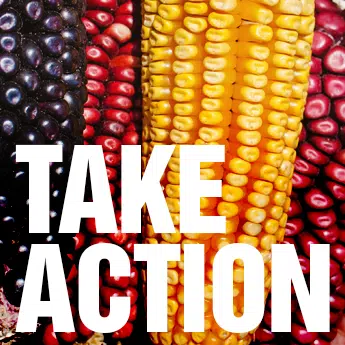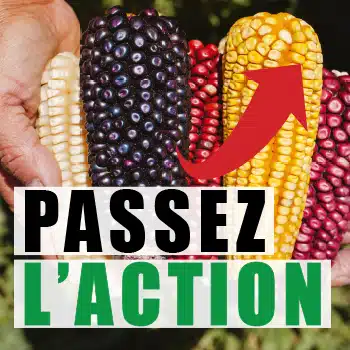April 9, 2024. Canadian public interest groups are critiquing the Government of Canada’s arguments against Mexico’s restrictions on genetically engineered (genetically modified or GM) corn that were published on Friday April 5th as part of a North American trade dispute.(1) Yesterday, 31 farmer, labour and environmental groups also published a statement objecting to Canada’s participation in the trade challenge.(2)
“The Canadian government is trying to force Mexico to drop its restrictions on using genetically modified corn for making traditional foods. Mexico is a sovereign nation with the right to determine the future of its food supply and its needs to take action protect native corn from GM contamination,” said Lucy Sharratt of the Canadian Biotechnology Action Network (CBAN) which published a response today to the Canadian government’s arguments.(3)
The US government launched a challenge to Mexico’s restrictions under the Canada-US-Mexico trade agreement (CUSMA). Canada joined the trade dispute as a third Party, though Canada does not export any corn to Mexico.
In its written submission to the trade dispute panel, Canada states its agreement with US government arguments that GM corn is safe for Mexican consumption. However, CBAN’s response argues that the science supports Mexico’s precaution, in particular because of the reliance on minimally processed corn in the daily diet of most Mexicans.
Mexico already bans the cultivation of GM corn but a Presidential Decree of February 13, 2023 restricts some uses of GM corn for human consumption, in particular the use of minimally processed GM (white) corn intended for use in dough and tortillas, to make traditional foods such as tortilla. The decree also orders a phase-out of GM corn for animal feed and processed food ingredients. The trade dispute does not challenge the decree’s phase-out of the use of the herbicide glyphosate that was originally scheduled to start on April I, 2024, but was recently paused.
“Mexico’s restrictions on GM corn and glyphosate are the result of decades of protest from farmers and Indigenous peoples but the Mexican government is under tremendous pressure to bow to the biotechnology and pesticide companies that want control over our food,” said Rick Arnold of the Trade Justice Group (TJG) of the Northumberland Chapter of the Council of Canadians.
Submissions to the trade dispute panel from eight civil society groups in the US and Mexico were also published on Friday, arguing the health risks of GM corn consumption and glyphosate exposure to Mexicans as well as the need for Mexico to restrict GM corn to protect native corn varieties and the rights of Indigenous Peoples. In December 2023, both CBAN and the Council of Canadians had also been given leave to submit arguments, however this invitation was revoked on a technicality after a request from the US government that was supported by the Canadian government. CBAN and the TJG of the Northumberland Chapter of the Council of Canadians published their arguments for public discussion in January.
For more information: Lucy Sharratt, Coordinator, Canadian Biotechnology Action Network, 902 209 4906, coordiantor@cban.ca ; Rick Arnold, Trade Justice Group of the Northumberland Chapter of the Council of Canadians, 905 352 2430, rickarnold@xplornet.com
NOTES:
(1) The Government of Canada’s submission to the trade dispute panel in the CUSMA dispute MEX-USA-2023-31-01 is posted at www.cban.ca/disputesubmissionCanada
(2) National Farmers Union, Press Release: Canadians support the right of the people of Mexico to determine their own relationship with corn, April 8, 2024 https://www.nfu.ca/canadians-support-the-right-of-the-people-of-mexico-to-determine-their-own-relationship-with-corn/
(3) Canadian Biotechnology Action Network, Response to Canada’s Arguments Against Mexico’s GM Corn Restrictions, April 9, 2024 www.cban.ca/traderesponse
For background and additional documents see www.cban.ca/trade
The Canadian Biotechnology Action Network (CBAN) brings together 16 groups to research, monitor and raise awareness about issues relating to genetic engineering in food and farming. CBAN members include farmer associations, environmental and social justice organizations, and regional coalitions of grassroots groups. CBAN is a project of MakeWay’s shared platform. www.cban.ca/trade
The Northumberland chapter is one of 45 local chapters of the Council of Canadians. For nearly four decades, these grassroots groups have organized across the country to challenge corporate power and advocate for people, the planet, and our democracy. Together, we have fought for values based on fair and sustainable trade, clean water, climate justice, democracy, and stronger public health care. The Council is a registered non-profit organization and does not accept money from corporations or governments. www.canadians.org






